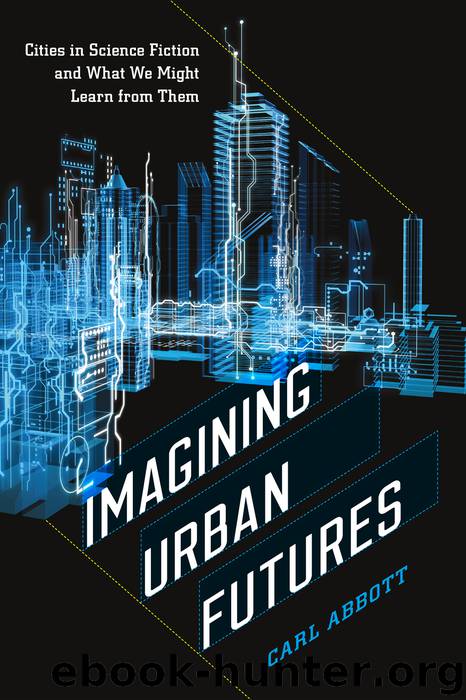Imagining Urban Futures by Abbott Carl;

Author:Abbott, Carl;
Language: eng
Format: epub
Publisher: Wesleyan University Press
Published: 2016-03-10T16:00:00+00:00
THE EVERTED METROPOLIS
In the nearly six decades since Gladiator-at-Law hit the shelves, Americans have continued to vote with their Chevrolets and Volkswagens (they could scarcely vote with their feet when many suburbs have no sidewalks). By the 1970 census, a plurality of Americans lived in suburban areas around major cities (76 million people, more than the number either in central cities or in rural areas and small towns). In 2000 the nation was officially suburban—146 million people, or 52 percent of all Americans.
But the suburban triumph can also be read as a suburban crisis. As early as the 1980s, social scientists realized that the aging of the baby boom generation was bringing problems to inner-tier suburbs. Moving beyond the cultural critique of Columbia and Harvard professors, they looked at reams of data to see that demand for housing was stagnant or falling and that declining numbers of students were rattling around in schools built for 1950s families. By the turn of the twenty-first century, it was clear that older suburbs often shared “central city problems” of declining tax base and crumbling infrastructure.
These declining environments make cameo appearances in Douglas Coupland’s novels about the suburban West Coast. On the outskirts of Palm Springs, where the cast of Generation X (1991) idle away their lives, sits West Palm Springs Village, “a bleached and defoliated Flintstones color cartoon of a failed housing development from the 1950s…. In an era when nearly all real estate is coveted and developed, West Palm Springs Village is a true rarity: a modern ruin and almost deserted save for a few hearty souls in Airstream trailers and mobile homes, who give us a cautious eye upon our arrival through the town’s welcoming sentry—an abandoned Texaco gasoline station surrounded by a chain link fence” (14–15). There is a failing shopping mall in Lancaster [Richland], Washington, in Shampoo Planet (1992), half its stores plywooded up or burned out. Even booming Palo Alto in Microserfs (1995) has an empty corporate research campus, unused after only two decades—“a 1970s utopian, Andromeda Strainishly empty tech complex” (211).
This very devaluation has made older suburbs the destinations of choice for new waves of international immigrants, turning the older suburbs of Boston, Atlanta, Portland, Los Angeles, and most other large cities into new melting pots. By the 2010 census, 51 percent of immigrants to the United States lived in the suburbs of the hundred largest metropolitan areas. In metropolitan areas as different as Hartford, Washington, and Orlando, more that 80 percent of foreign-born residents were suburbanites. The suburbs also pick up more and more folks on the economic margins; the number of poor people in suburban rings rose by a whopping 67 percent from 2000 to 2011. The political impacts of these trends have been well documented by urban scholar and activist Myron Orfield in American Metropolitics: The New Suburban Reality (2002).
In a larger framework, geographers Rob Kitchin and James Kneale have suggested that the everted metropolis is the natural product of information-age capitalism. Reversing the
Download
This site does not store any files on its server. We only index and link to content provided by other sites. Please contact the content providers to delete copyright contents if any and email us, we'll remove relevant links or contents immediately.
| Books & Reading | Comparative Literature |
| Criticism & Theory | Genres & Styles |
| Movements & Periods | Reference |
| Regional & Cultural | Women Authors |
4 3 2 1: A Novel by Paul Auster(11761)
The handmaid's tale by Margaret Atwood(7421)
Giovanni's Room by James Baldwin(6774)
Asking the Right Questions: A Guide to Critical Thinking by M. Neil Browne & Stuart M. Keeley(5336)
Big Magic: Creative Living Beyond Fear by Elizabeth Gilbert(5321)
Ego Is the Enemy by Ryan Holiday(4919)
On Writing A Memoir of the Craft by Stephen King(4647)
The Body: A Guide for Occupants by Bill Bryson(4555)
Ken Follett - World without end by Ken Follett(4426)
Bluets by Maggie Nelson(4242)
Adulting by Kelly Williams Brown(4210)
Eat That Frog! by Brian Tracy(4127)
Guilty Pleasures by Laurell K Hamilton(4095)
White Noise - A Novel by Don DeLillo(3815)
The Poetry of Pablo Neruda by Pablo Neruda(3796)
Fingerprints of the Gods by Graham Hancock(3718)
Alive: The Story of the Andes Survivors by Piers Paul Read(3713)
The Book of Joy by Dalai Lama(3668)
The Bookshop by Penelope Fitzgerald(3606)
